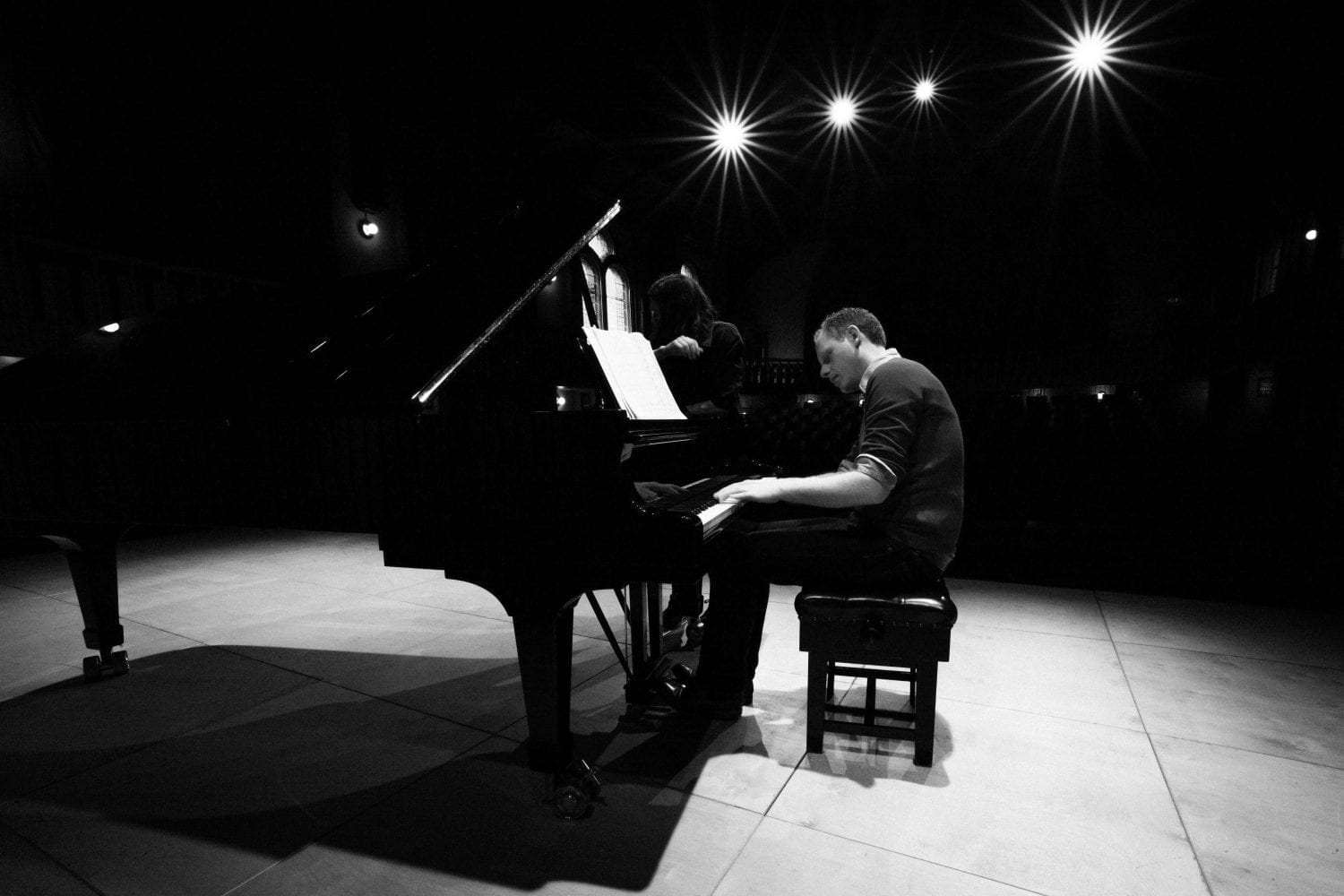Clara Mouriz, Roderick Williams, Joseph Middleton, Wigmore Hall review - the song recital as mixtape | reviews, news & interviews
Clara Mouriz, Roderick Williams, Joseph Middleton, Wigmore Hall review - the song recital as mixtape
Clara Mouriz, Roderick Williams, Joseph Middleton, Wigmore Hall review - the song recital as mixtape
A bold programme of Ravel with off-piste adventures

It’s the age of the mixtape. And of the Only Connect sequences round.
The Ravel songs were focused on those with more exotic and folk-ish inspiration. They included some rarities, such as his setting of “Ye Banks and Braes”, the “Chanson Écossaise” of 1910, which starts off on a watery note with an introduction reminiscent of Debussy’s “Reflets dans l’eau” from 1905, but then sets the folksong in a fairly straightforward manner. And that song gave the pretext for an off-piste adventure: it was paired with “Ca’The Yowes”, a Scottish folksong collected by Robert Burns and forever associated with Kathleen Ferrier. In similar vein, another of Ravel’s “Chants Populaires”, the “Chanson hébraïque” ushered in Robert Schumann’s “Aus den hebräischen Gesängen”, a German translation of Byron.
This way of building programmes seems to suit Joseph Middleton (pictured below by Gerard Collett) very well. He has that skill and knack of the great song pianists, which is to establish the mood and feel of a song more or less instantly. And he can do it again and again. The decision to start the programme, for example, by launching us straight into the dark, mysterious E flat minor world of the song “Asie” from the Shéhérazade, which keeps us in rapt wonder in a strange exotic world for most of 10 minutes was a bold one, but, in its own way, it worked. This approach to building a programme does, however, place very great demands on the singers. Spanish mezzo-soprano Clara Mouriz survived the challenge very well musically. She was at her absolute best in the “Chansons madécasses”, that extraordinary mid-1920s concoction, where her shaping of phrases, her melodic interaction with flautist Adam Walker and cellist Guy Johnston were both exquisite and jaw-dropping. But as regards the range of emotions, there was perhaps more to question, more to have hoped for. She seemed determined to make Ravel’s “Vocalise-étude en forme de Habanera” an opportunity to be vampish and almost camp-ish; it didn’t really work. And Guridi’s “No quiero tus avellanas” needed much more authority and emotional heft. And whereas Mouriz’ French was normally understandable and idiomatic, her ability to differentiate the “e acute” from the “e caduc” was particularly unreliable. It just needs work to put that right.
This approach to building a programme does, however, place very great demands on the singers. Spanish mezzo-soprano Clara Mouriz survived the challenge very well musically. She was at her absolute best in the “Chansons madécasses”, that extraordinary mid-1920s concoction, where her shaping of phrases, her melodic interaction with flautist Adam Walker and cellist Guy Johnston were both exquisite and jaw-dropping. But as regards the range of emotions, there was perhaps more to question, more to have hoped for. She seemed determined to make Ravel’s “Vocalise-étude en forme de Habanera” an opportunity to be vampish and almost camp-ish; it didn’t really work. And Guridi’s “No quiero tus avellanas” needed much more authority and emotional heft. And whereas Mouriz’ French was normally understandable and idiomatic, her ability to differentiate the “e acute” from the “e caduc” was particularly unreliable. It just needs work to put that right.
Roderick Williams, by contrast, was suave and urbane in the first half in Ravel’s hastily written “Cinq mélodies populaires grecques”, then witty and detached in “Don Quichotte à Dulcinée”. In the second half, there was more emotion from him, notably in Schumann’s “Aus den hebräischen Gesängen”. And the encore, Duparc’s “La Fuite”, mostly remarkable for its Herculean piano part, underlined the idea that this had indeed been the pianist’s night.
rating
Explore topics
Share this article
The future of Arts Journalism
You can stop theartsdesk.com closing!
We urgently need financing to survive. Our fundraising drive has thus far raised £49,000 but we need to reach £100,000 or we will be forced to close. Please contribute here: https://gofund.me/c3f6033d
And if you can forward this information to anyone who might assist, we’d be grateful.

Subscribe to theartsdesk.com
Thank you for continuing to read our work on theartsdesk.com. For unlimited access to every article in its entirety, including our archive of more than 15,000 pieces, we're asking for £5 per month or £40 per year. We feel it's a very good deal, and hope you do too.
To take a subscription now simply click here.
And if you're looking for that extra gift for a friend or family member, why not treat them to a theartsdesk.com gift subscription?
more Classical music
 BBC Proms: The Marriage of Figaro, Glyndebourne Festival review - merriment and menace
Strong Proms transfer for a robust and affecting show
BBC Proms: The Marriage of Figaro, Glyndebourne Festival review - merriment and menace
Strong Proms transfer for a robust and affecting show
 BBC Proms: Faust, Gewandhausorchester Leipzig, Nelsons review - grace, then grandeur
A great fiddler lightens a dense orchestral palette
BBC Proms: Faust, Gewandhausorchester Leipzig, Nelsons review - grace, then grandeur
A great fiddler lightens a dense orchestral palette
 BBC Proms: Jansen, Royal Concertgebouw Orchestra, Mäkelä review - confirming a phenomenon
Second Prom of a great orchestra and chief conductor in waiting never puts a foot wrong
BBC Proms: Jansen, Royal Concertgebouw Orchestra, Mäkelä review - confirming a phenomenon
Second Prom of a great orchestra and chief conductor in waiting never puts a foot wrong
 BBC Proms: Royal Concertgebouw Orchestra, Mäkelä review - defiantly introverted Mahler 5 gives food for thought
Chief Conductor in Waiting has supple, nuanced chemistry with a great orchestra
BBC Proms: Royal Concertgebouw Orchestra, Mäkelä review - defiantly introverted Mahler 5 gives food for thought
Chief Conductor in Waiting has supple, nuanced chemistry with a great orchestra
 Dunedin Consort, Butt / D’Angelo, Muñoz, Edinburgh International Festival 2025 review - tedious Handel, directionless song recital
Ho-hum 'comic' cantata, and a song recital needing more than a beautiful voice
Dunedin Consort, Butt / D’Angelo, Muñoz, Edinburgh International Festival 2025 review - tedious Handel, directionless song recital
Ho-hum 'comic' cantata, and a song recital needing more than a beautiful voice
 Classical CDs: Dungeons, microtones and psychic distress
This year's big anniversary celebrated with a pair of boxes, plus clarinets, pianos and sacred music
Classical CDs: Dungeons, microtones and psychic distress
This year's big anniversary celebrated with a pair of boxes, plus clarinets, pianos and sacred music
 BBC Proms: Liu, Philharmonia, Rouvali review - fine-tuned Tchaikovsky epic
Sounds perfectly finessed in a colourful cornucopia
BBC Proms: Liu, Philharmonia, Rouvali review - fine-tuned Tchaikovsky epic
Sounds perfectly finessed in a colourful cornucopia
 BBC Proms: Suor Angelica, LSO, Pappano review - earthly passion, heavenly grief
A Sister to remember blesses Puccini's convent tragedy
BBC Proms: Suor Angelica, LSO, Pappano review - earthly passion, heavenly grief
A Sister to remember blesses Puccini's convent tragedy
 BBC Proms: A Mass of Life, BBCSO, Elder review - a subtle guide to Delius's Nietzschean masterpiece
Mark Elder held back from blasting the audience with a wall of sound
BBC Proms: A Mass of Life, BBCSO, Elder review - a subtle guide to Delius's Nietzschean masterpiece
Mark Elder held back from blasting the audience with a wall of sound
 BBC Proms: Le Concert Spirituel, Niquet review - super-sized polyphonic rarities
Monumental works don't quite make for monumental sounds in the Royal Albert Hall
BBC Proms: Le Concert Spirituel, Niquet review - super-sized polyphonic rarities
Monumental works don't quite make for monumental sounds in the Royal Albert Hall
 Frang, Romaniw, Liverman, LSO, Pappano, Edinburgh International Festival 2025 review - sunlight, salt spray, Sea Symphony
Full force of the midday sea in the Usher Hall, thanks to the best captain at the helm
Frang, Romaniw, Liverman, LSO, Pappano, Edinburgh International Festival 2025 review - sunlight, salt spray, Sea Symphony
Full force of the midday sea in the Usher Hall, thanks to the best captain at the helm
 Elschenbroich, Grynyuk / Fibonacci Quartet, Edinburgh International Festival 2025 review - mahogany Brahms and explosive Janáček
String partnerships demonstrate brilliant listening as well as first rate playing
Elschenbroich, Grynyuk / Fibonacci Quartet, Edinburgh International Festival 2025 review - mahogany Brahms and explosive Janáček
String partnerships demonstrate brilliant listening as well as first rate playing

Add comment